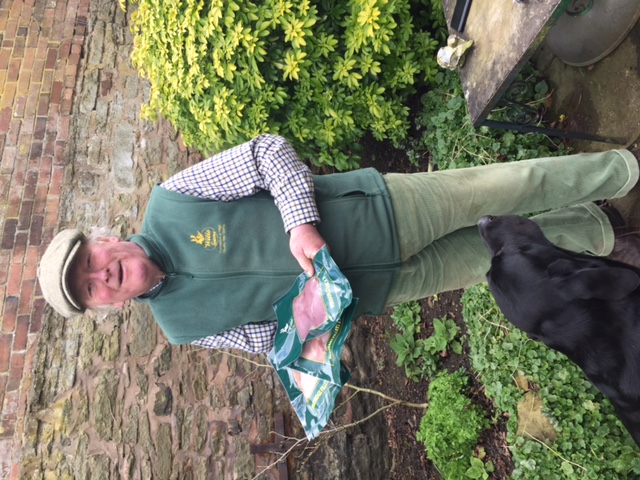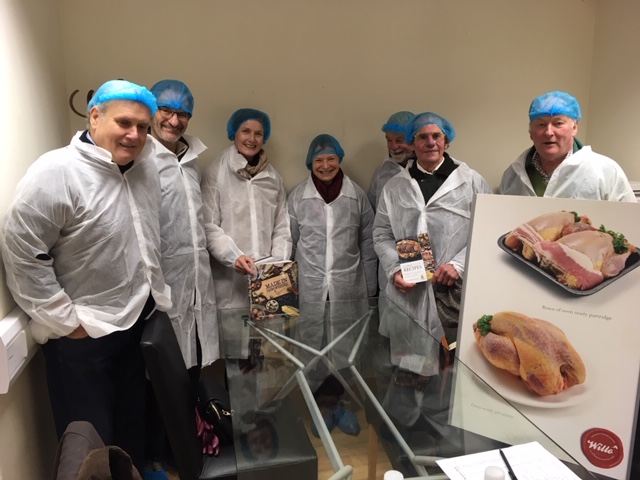Based in the beautiful South Shropshire countryside with premises nestled under the imposing Longmynd ridge, WilloGame supply high quality and innovative Wild Game, throughout the country and found in many of the top Michelin starred restaurants. WilloGame also export abroad, where prime British Wild Game is seen as a valued product both on the Continent, the Middle East and indeed the Far East.
Willo Game
Website: https://www.willogame.co.uk/
Facebook: @willogame1
Tel: 01588 650119
Behind the Scenes with Nick James from WilloGame
This year has brought some big changes for us all, how did that impact on your business?
It’s interesting to see how things have been changing overall; the adaptations that businesses have made, how the public has been experimenting with food and how that has given rise to a lot of opportunities.
I think at WilloGame we’ve become more consumer orientated, as several of our customers steered their own businesses in this direction with their historical markets simply vanishing.
The lockdown has encouraged people to eat better quality. Because meals have become more central a focus during lockdown, they have often been spending more time making a plan for the meal and then sitting down and really enjoying it. I think that when we come out of lockdown there will be some who still feel uneasy about going out and mixing with the wider world, but many will welcome the simple pleasure of eating out again in restaurants. I also reckon we will see a huge amount of home entertaining as people gather with close friends and family again. In a sense it really engages with the whole ethos of Slow Food – eating good food, of good provenance and local.
How would you say WilloGame as a business connects with Slow Food?
WilloGame is a supporter of the ethos of Slow Food not just in the way of enjoying quality produce together round a table, but also in the uniqueness of the product itself. Here, on our very doorstep, we have the unique Long Haired Fallow deer found in and around the Mortimer Forest in South Shropshire. This now has “Ark status” and is what drew us into the wonderful fellowship of Slow Food.
What particular challenges did you face as a result of the pandemic?
For us the pandemic brought two problems. Our business is based on harvesting wild Game and a high percentage of our products come from the shoots that take place across the area. Clearly under the restrictions, these were largely cancelled as people weren’t allowed to travel between tiers, leading to a huge shortage of supply. 90% of our produce comes from North Wales, the Marches and the Midlands. Everything coming into our plant is wild. We still had good throughput of Deer and Wild Boar, but feathered Game was a big problem due to lockdown. On top of this, we then had the affects of Brexit. The rules on export have changed and this has brought further limitations.
Yes, it’s been a collision of events in the same time frame. How did you address this?
We were pleased to find new distributors in the UK who supply direct to consumers, but it’s been a juggling act to meet all their needs. We have been really looking at consumer patterns. “Frozen is the new fresh”, as you can get a perfect product straight out of the freezer. This really changes the pattern of Game consumption beyond the traditional Game season. To meet these changing patterns, we have moved away from whole birds and more into products with marinades and portions such as fillets, thighs etc which can then be used in oriental stir-fry recipes, for example. There’s such versatility with Game. It’s not stuffed with antibiotics and the flavour has benefitted from it being free to roam and fly. There’s a whole education process that the industry needs to work on.
We have also developed more green packaging that’s recyclable. We’ve looked at the packaging for couriers, using wool insulation to keep products cold and well designed packets and trays that look more compelling at the point of retail. The aim is to encourage more impulse buys so the consumer is tempted by the product. We hope that those cooking at home, who have never eaten game before, will give it a try. It’s such a nutritious source of food after all!
How did the Lockdown affect your staffing?
Generally we operate at peak time with seasonal staff drawn from local labour and elsewhere – with around forty four staff employed, including the collection. We are more like a cooperative, because many of our suppliers are also owners of WilloGame, so we have close audit control from point of supply to final distribution. Each batch collected has a unique code which then follows it through the whole process, so we can always track back where it came from. We also adhere to the strict hygiene regulations for managing each process area. We don’t hang any of our Game in the old fashioned way; we just get it in, chill it and process it. We work with Game which has flavour compared to chicken. Feathers and deer skin are the only things we can’t find a use for! Although, someone who made drums did show an interest in our deer skins, but he only made a very small number each year!
We were pleased to have only furloughed six staff for just two weeks and as we speak, in March, we are still flat out preparing export orders that have been held up.
What would you say were the positive things to come out of this?
The biggest change has come as a result of working out that we are maybe closer to the consumer than we thought, although we are not directly customer facing, as we are a prime processor and direct our business towards the distributors. 50% of our feather Game is exported to the Continent and the Far East. Without doubt Covid has altered socio-economic and buying patterns quicker than anything I’ve seen in my working life. I predict that most will remain and I’m hopeful that consumers will be far more interested in where their food comes from and the people behind it. Slow Food, however, was ahead of this!
We’ve also looked harder at our packaging, making it greener, and moved towards more frozen produce and even gluten free sausages and burgers. We’d like to make Game more accessible and more exciting for the consumer as it really is so versatile.
Has Brexit affected you much?
We, as a company, will probably end up benefitting from Brexit in the long term. A huge amount of UK Game went abroad in feather, both fresh and frozen. Feathered Game can’t be exported from shoots direct now, unless it has been inspected by a vet. We employ a vet here and are accredited, which means that we can process Game for estates that would previously have exported direct.
The other problems that have arisen have been for those who send forwarding agents to collect produce from WilloGame, who have been struggling to get hold of lorries. Fearful of hold-ups, lorries are returning abroad empty. It’s actually easier to export to Hong Kong than it is to the Continent at present, but no doubt it will eventually settle down.
I hope that at the very least this last year has helped people reflect on and realise what rich resources we have here on our doorstep from our local producers and I, for one, really look forward to seeing groups of friends gathered round a table sharing menus of Game, but there is a lot of food ignorance still around – so we still have a mission!

Nick James with WilloGame products. Slow Food Members visit Willo Game in 2019



